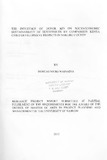| dc.description.abstract | Poverty has had a great impact on people’s ability to sustain themselves, preventing development in education, health, environmental stewardship and social factors of human life. Compassion Kenya (CKE) is a Christian nonprofit making organization dedicated to holistic development of children in poverty. The purpose of this study was to assess the influence of donor aid socio-economic sustainability of households by Compassion Kenya children development projects in Nakuru County, Kenya. The objectives of this study were: to establish the extent to which education and training influence socioeconomic sustainability of households, to assess the extent to which Income Generating Activities influence socio-economic sustainability of households, and to examine the extent to which social networks influence socio-economic sustainability of households by Compassion Kenya Child Development projects in Nakuru County. A descriptive survey design was used because it was simple to administer through questionnaire which was appropriate in collecting and analyzing data from a cross section of respondents selected in the study area. The target population of interest consisted of the Caregivers in the 12 Compassion assisted projects in Nakuru Cluster. The researcher used Purposive Sampling, a non probability sampling technique to select subjects on the basis of being in existence in the project for more than 10 years and their being informative. This constituted 10 caregivers in each of the 12 projects giving a total of 120 caregivers as the sample size. This study administered questionnaires to collect its primary data. Secondary data was gathered from the organization’s statistics. The research instruments were checked for validity using construct validity whj^h.fipfasures the degree to which data obtained meaningfully and accurately represents a theoretical concept or abstract. This research also used a Test-Retest Reliability method whereby the same instrument was administered twice to the same group of subjects with a time lapse to measure the degree to which the instrument yields consistent results. Data collected was analyzed using Statistical Packages for Social Sciences and Descriptive statistics were used to explain findings of the study by use of the frequency tables, percentages and statements. The study findings were able to review recommendations such as the need to establish strategies to support completion of primary, secondary and tertiary education levels as well as promote vocational trainings designed on the basis of needs assessment ensuring relevant and adequate education and training towards self-employment in IGAs; there was need for increased income generating activities to increase the income levels and last but not least, people need to be empowered to participate in social networks and promoting natural resources management for better agricultural production. The study suggested further research to identify the level of improvement on socio-economic sustainability as well as to establish the attitudes, views and challenges of financing institutions on income generating activities towards socio-economic development by low income earners. | |

